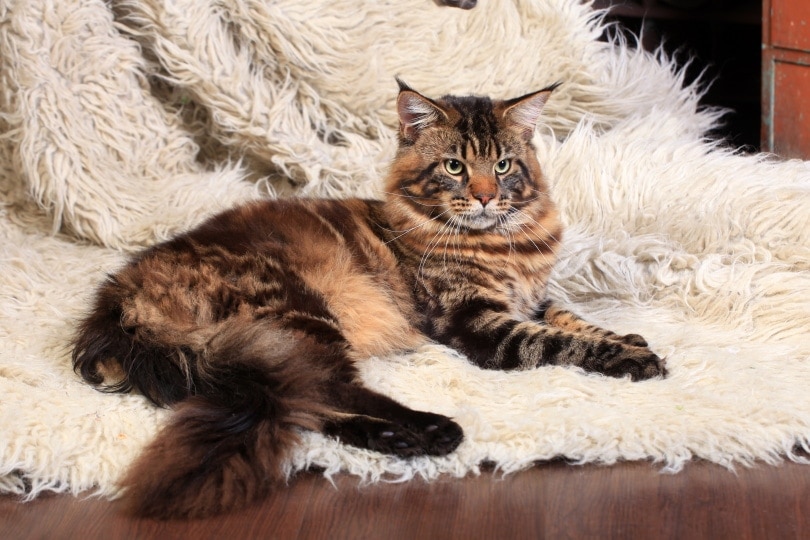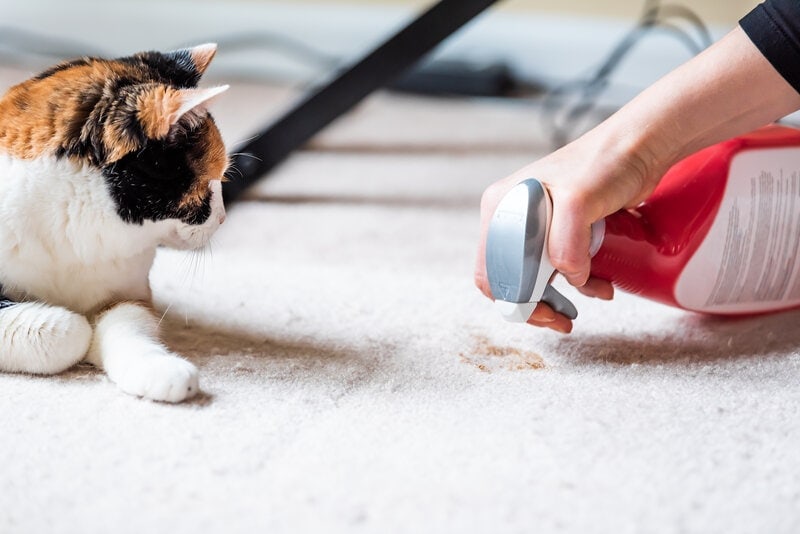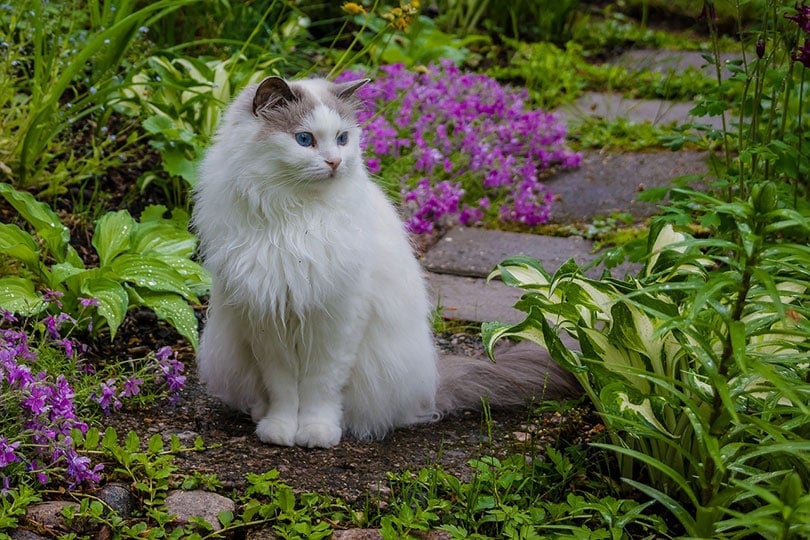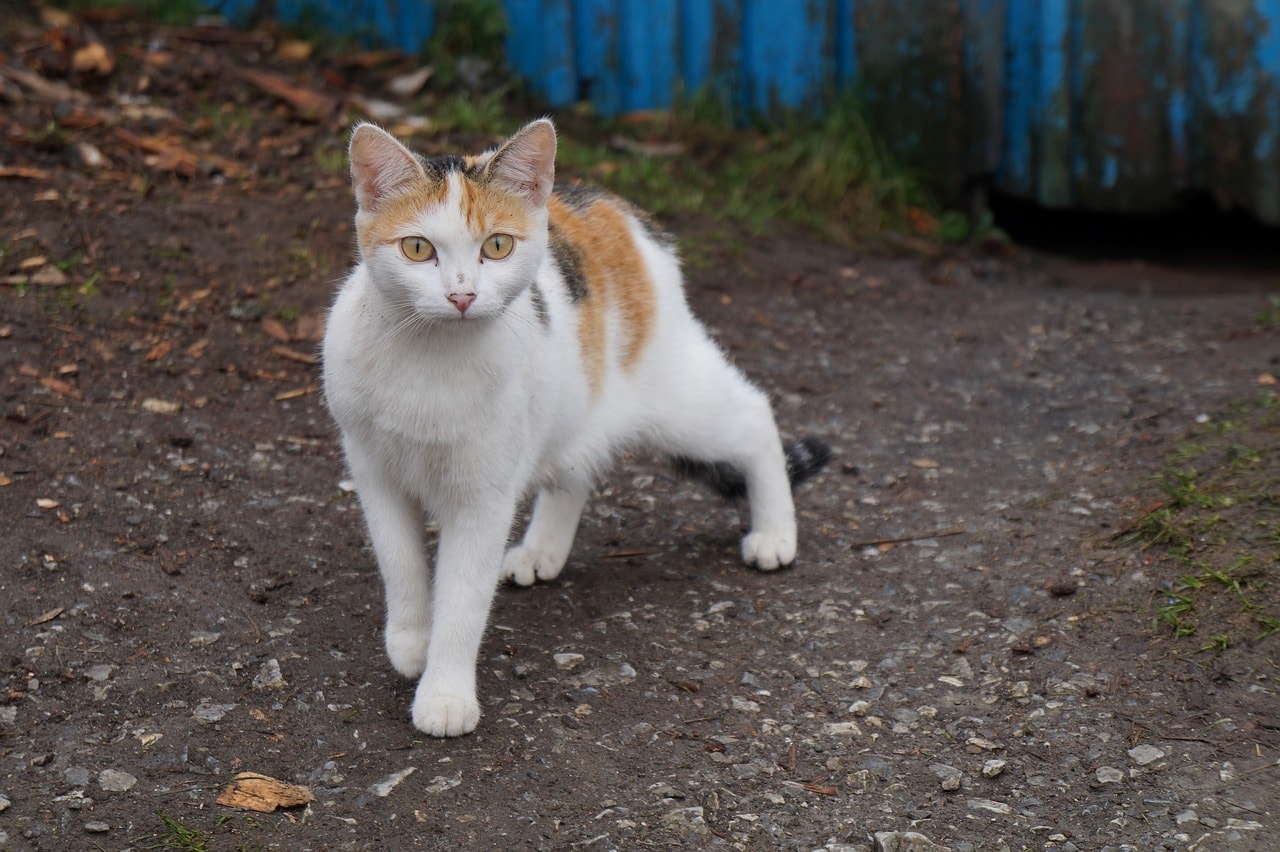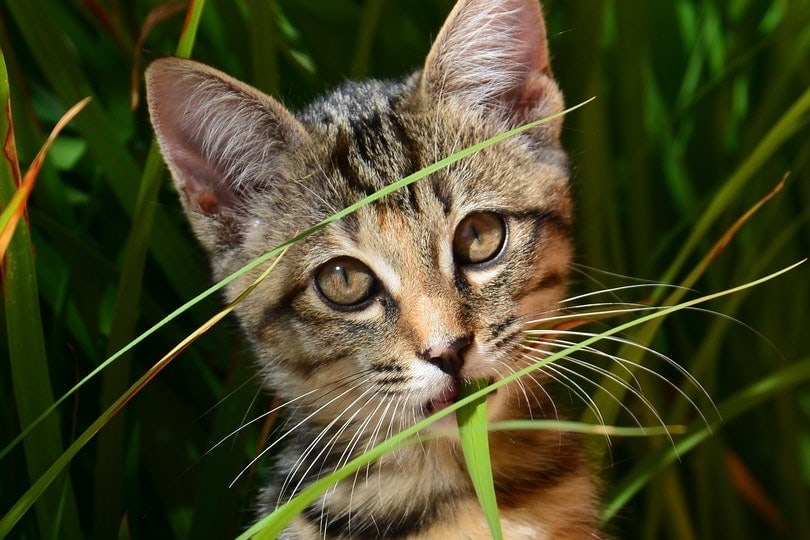The Tabby Maine Coon is a loving, social, and ginormous cat that makes one of the best companions you can hope for. While some may think their size is intimidating, nothing could be further from the truth as they are amongst the gentlest of the breeds.
You’re probably accustomed to Maine Coons with the tabby coloring, so we’re going to have a deeper look at not just the Maine Coon, but those with the tabby markings. So, you’ve come to the right place if you want to learn more about the tabby Maine Coon.
The Earliest Records of the Tabby Maine Coon in History
The Maine Coon is thought to have its origins in Wiscasset, Maine, back in the 1800s, but no one truly knows how they actually came into existence. Some believe they are the offspring of domestic shorthaired cats and longhaired cats from overseas (like Angoras).
They actually got their name from the very false myth that Maine Coons came from the mating between longhaired domestic cats and raccoons! This myth probably stemmed from the commonly seen brown tabby Maine Coon in addition to his large size and bushy tail.
Even with all of the mystery surrounding the Maine Coon, one thing is certain—the most common Maine Coon back in the 1800s was the tabby.

How the Tabby Maine Coon Gained Popularity
Tabby Maine Coons were quite popular in the 1800s when they were initially discovered, but they actually fell out of favor in the 1900s thanks to the introduction of other longhaired cats imported from Europe—particularly the Persian.
The Maine Coon retained a lot of its acclaim in New England but didn’t regain its popularity until about the 1950s when cat fanciers took a renewed interest. In fact, they had lost so much popularity that before their resurgence in the 1950s, some believed the Maine Coon was extinct! Lucky for us humans, this was untrue.
Maine Coon breeders brought the breed back into the spotlight, and they are now one of the most popular cat breeds around. As of 2020, the Maine Coon is the 3rd most popular breed according to The Cat Fanciers’ Association (CFA), based on their worldwide registration statistics.
Formal Recognition of the Tabby Maine Coon

The Maine Coon was accepted in the CFA’s championship status in 1976, and they have reported that the Maine Coon tops the most significant number of entries in a CFA show. It’s also not unusual that a Maine Coon is made Best Cat in a ring or the entire show. They were also accepted for championship competition by The International Cat Association in 1979.
You can only imagine that there are numerous associations and clubs that are based around the Maine Coon, given how popular they are.
There’s the Maine Coon Breeders & Fanciers Association established in 1968, the Maine Coon Breed Society, which is affiliated with the Governing Council of the Cat Fancy (based out of the UK), and the United Maine Coon Fanciers of Australia, to name a few. The Maine Coon is a large cat with a large following.
Different Colors and Patterns of the Tabby Maine Coon
The tabby Maine Coon has a number of patterns and colors that are worth exploring. There are three different tabby patterns:
1. Classic Tabby
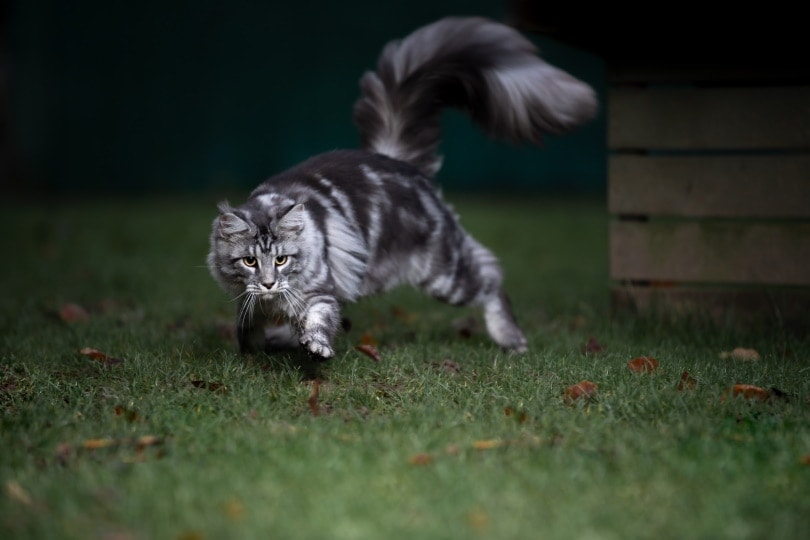
This is the tabby pattern we are very familiar with. There are typically broad and swirling patterns along the cat’s sides (kind of like a marble cake) but can also look like a bullseye or a target.
2. Ticked Tabby
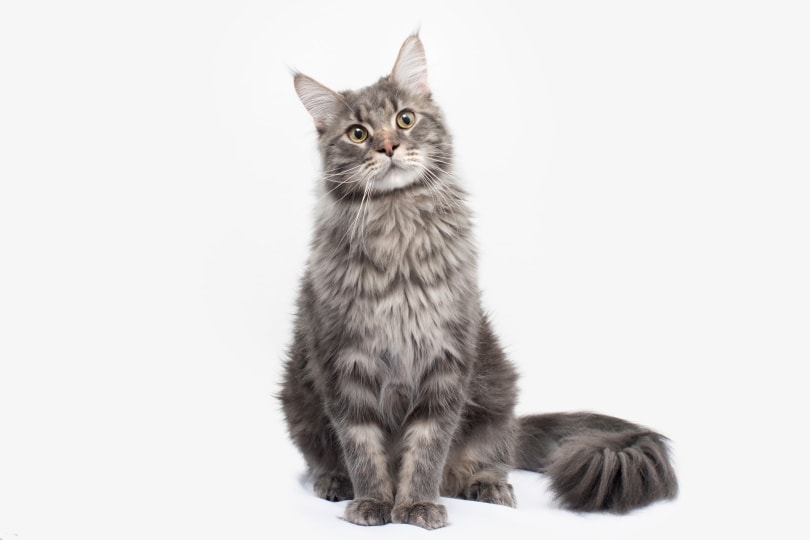
This pattern is typically agouti, which actually is the background color, but each individual hair has two or more bands of color. The traditional tabby pattern is more apparent on the legs and face, and sometimes the belly.
3. Mackerel Tabby
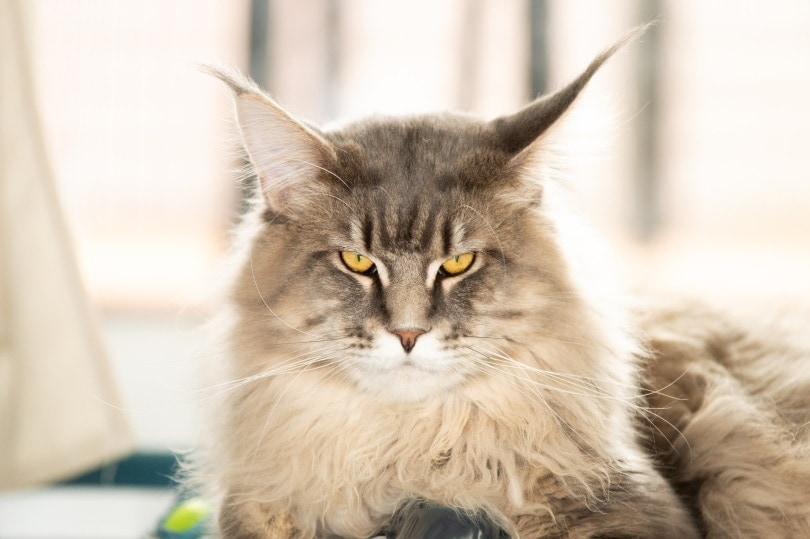
This pattern features thin stripes that run down the cat’s sides parallel to each other. These stripes emerge from a long stripe down the center of the Maine Coon’s back, which more or less resembles a fish skeleton, which is where this pattern got its name.
Now that we’ve gone over the patterns, we’ll have a look at the 12 different color categories:
- Brown Tabby
- Brown Patched Tabby
- Brown Tabby & White
- Brown Patched Tabby & White
- Silver Tabby
- Silver Patched Tabby
- Silver Tabby & White
- Silver Patched Tabby & White
- Red Tabby
- Red Tabby & White
- All Other Tabby & White Colors
- All Other Tabby Colors (this includes cream, cream-silver, cameo, blue, blue-patched, blue-silver, and blue-silver patched)
One other feature that most, if not all, tabbies display, is what looks like the capital letter ‘M’ on their foreheads. Have a look at the next tabby cat you see.
The tabby pattern is the most common, if not the most popular, markings for the Maine Coon.
Did you know that Maine Coon’s come in lots of other colors, including grey, orange, black, and even tuxedo?
- See also: Maine Coon & Siamese Cat Mix
Top 8 Unique Facts About Tabby Maine Coons
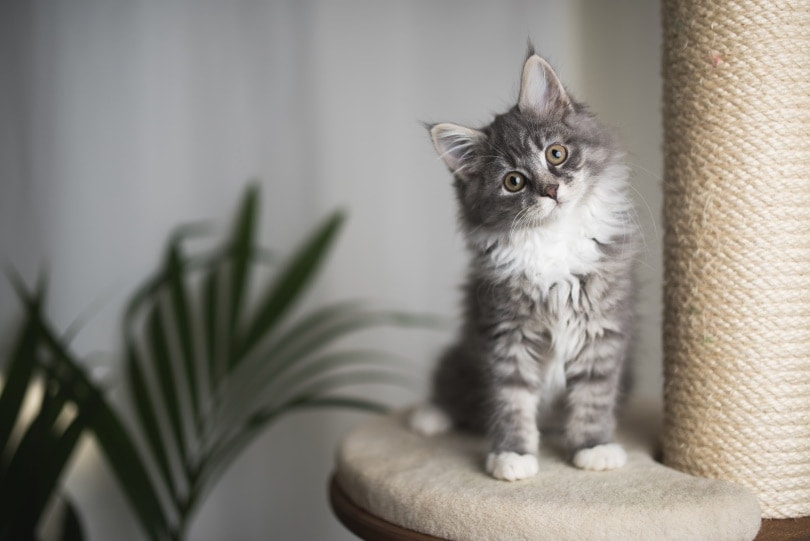
- The first Maine Coon that ever won in a cat show was a brown tabby. This was in 1895 at the Madison Square Garden Show and went to a female called “Cosey.”
- The Maine Coon is the official state cat of Maine, which was bestowed in 1985.
- The Maine Coon is the only longhaired cat native to America and one of North America’s oldest natural breeds.
- Maine Coons tend to enjoy the water. They do have a somewhat water-resistant coat, which might be part of the reason, but they seem to enjoy playing with and in water.
- Maine Coons do meow but frequently trill and chirp. In fact, they probably trill and chirp more often than they meow. They are chatty cats, all told.
- Maine Coons with polydactyl (have 6 toes) have their own separate entry in The International Cat Association (TICA).
- It’s believed that Maine Coons descend from the Norwegian Forest Cat, which traveled with the Vikings on their ships. It’s true that there’s more than a passing resemblance.
- Another myth surrounding the Maine Coon is some believe that these cats are descended from Marie Antoinette’s Persians that she sent to Wiscasset, Maine when she planned to escape from France.

Does the Tabby Maine Coon Make a Good Pet?
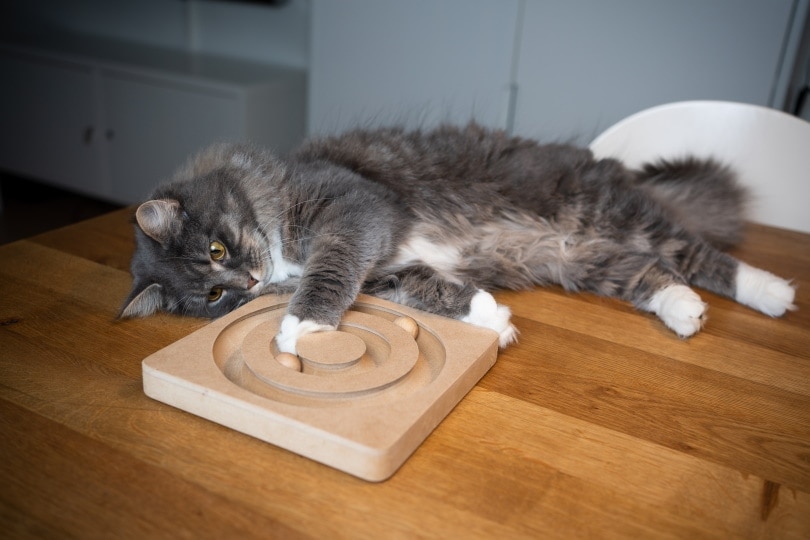
It doesn’t get much better than owning a Maine Coon cat. You’ve heard of the gentle giants of the dog world, but the Maine Coon is the gentle giant of the cat world. They are known for their sweet natures and intelligence and are loving, friendly, and social.
As far as grooming goes, they do have thick coats that might need to be groomed every day, but as long as you start grooming them when they are kittens, it should prove to be a lovely bonding experience for you both.
They are cats, so they do tend to get into mischief from time to time, but it’s very easy to forgive them thanks to their good-natured ways.
You can also expect them to follow you from room to room as they genuinely enjoy spending time with you. Maine Coons also get along very well with children and other pets.
And let’s not forget how playful they can be! The Maine Coon is smart enough to learn tricks and can also go for walks on a leash and enjoy playing fetch.
Conclusion
Maine Coons might have some myth and mystery surrounding their origins, but there isn’t any mystery as to why they are as popular as they are. These gorgeous, shaggy coats, large paddy paws, and striking tufts on their ears make them eye-catching cats. Then you have that fantastic personality! How can you not want to spend time with a Maine Coon, tabby or otherwise?
Featured Image Credit: Rosa Jay, Shutterstock
